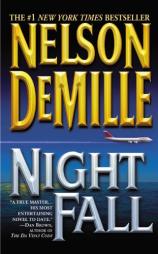Interview: November 24, 2004
November 24, 2004
Bookreporter.com Co-Founder Carol Fitzgerald and senior writer Joe Hartlaub interviewed Nelson DeMille, author of NIGHT FALL. This latest thriller is a fictional account of the TWA Flight 800 disaster, and in this interview DeMille explains what he thinks happened on that fateful night in July 1996. He also talks extensively about his writing routine, names the authors who inspired him to be a writer, and provides readers with a sneak preview of his next novel.
Bookreporter.com: After all your research into Flight 800, what do you think happened?
Nelson DeMille: Forensic evidence for a mechanical malfunction is strong, but not conclusive. The eyewitness accounts of a streak of light --- a missile --- heading for the aircraft is hard to dismiss. I'd say this contradictory evidence defines a mystery. I'd like to see the case reopened.
BRC: Unlike many authors, you write at your own pace instead of on a calendar schedule that has you delivering a book a year. At what point did you decide to do this?
ND: It was never a decision --- it was just a life style. Too much writing, like too much of any kind of work leads to mistakes, sloppiness, and bad output. I could double my income by doubling my output, but I think the quality of the work would suffer, as well as the quality of my life.
BRC: When do you title your books --- before you start, or as you write?
ND: Interesting question. Usually I have a title in mind before I begin writing, but the title can change during or after I've finished. I've discovered that it's best to keep the title to yourself until you're finished with the book and like the title --- if you title a book early, the title will sometimes appear in the publisher's news releases or catalogue, and then, if you want to change the title, it becomes a problem.
BRC: You do not use a computer to write. What do you enjoy about writing a book longhand?
ND: Writing longhand has many advantages, especially for someone like me who can't type. I really think there's a more direct connection between the brain, eye, and hand if you're writing with pen or pencil, looking down at what you've written. The typing process, which I've tried, seems mechanical, non-fluid, and slower than script writing. Also, with handwriting, it's easier to make corrections, deletions, and additions with the stroke of a pen. Finally, I make a lot of marginal notes on the handwritten manuscript, which you can't do with a computer. It all works for me.
BRC: Do you research and then write, or do you research as you go along?
ND: Good question. I research first, because I get a lot of good plot ideas from the research --- truth is often stranger, and more interesting than fiction. Then, as I'm writing I research specific scenes, then finally, I do a fact check at the end.
BRC: Do you outline or write more stream of consciousness?
ND: My first books were more a stream of consciousness, but as I learned in college, a good outline is like a good road map. So now, I'm outlining more, but a good writer should not be confined by his or her own outline. You need to see opportunities that arise during the writing and stray form the outline as you'd stray from a road map if you saw something interesting --- like a nude beach --- that's off your route.
BRC: When you are writing, what is your schedule like?
ND: I'm not a morning person, so I do mindless things in the a.m. Then, about noon I begin writing. IF it's going well, I'll write until eight or nine p.m. Some of my best writing has been done late at night into the early morning. I've written until dawn on some occasions --- especially when the book is overdue.
BRC: Have you begun your next novel yet? Can you share anything about it?
ND: I'm in the research stage of my new novel, and all I can say about it is that it involves a plot by Mideast terrorists to detonate a nuclear device in an American city. This plot has been used by other writers, but, of course, I've added some twists.
BRC: Are any of your characters like you? If so, who?
ND: I suppose to some extent my male heroes are like me --- funny, sexy, smart, brave, good looking and humble.
BRC: Which authors have been your primary sources of literary inspiration?
ND: I grew up reading Hemingway, Graham Greene, John Steinbeck, Conan Doyle and Agatha Christie. There were others, mostly British, but I never consciously emulated their style or wanted to write like them --- they did, however, inspire me to be a writer.
BRC: If you weren't writing, how would you make a living?
ND: I think I'd like to do something more physical. Most of my life before I started writing was physical --- sports in high school and college, three years as an infantry officer, hunting, deep sea fishing, construction jobs, and lots of time in the gym. But I'd like to use my brain, too, so I'd like to be an archeologist. This has always fascinated me, and I touched on it in my first novel, BY THE RIVERS OF BABYLON. I'm sure I'll return to that subject again in one of my books, so that I can become an archaeologist, vicariously.




